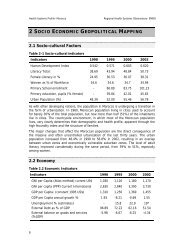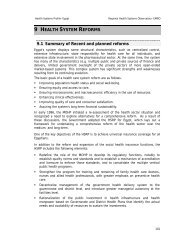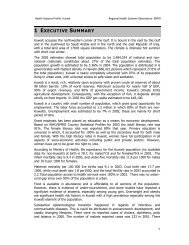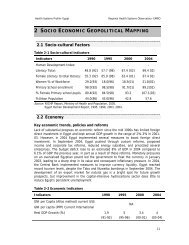The role of contractual arrangements in improving health sector ...
The role of contractual arrangements in improving health sector ...
The role of contractual arrangements in improving health sector ...
You also want an ePaper? Increase the reach of your titles
YUMPU automatically turns print PDFs into web optimized ePapers that Google loves.
F<strong>in</strong>anc<strong>in</strong>g<br />
Bahra<strong>in</strong><br />
<strong>The</strong>re is a clear doubt whether the contracted services are a priority one. Despite the fact<br />
that clean<strong>in</strong>g and ma<strong>in</strong>tenance services are protected by the contracts, the hospital budget has<br />
not been severely cut. This gives the hospital flexibility to transfer funds from low-priority to<br />
high-priority areas. <strong>The</strong> contracted services are f<strong>in</strong>anced by the M<strong>in</strong>istry <strong>of</strong> Health regular<br />
budget. In many cases, as the cost <strong>of</strong> contracts goes up from year to year, it is easier to secure<br />
additional budget from the M<strong>in</strong>istry and F<strong>in</strong>ance and National Economy to cover the <strong>in</strong>crease,<br />
although additional justification has to be provided. <strong>The</strong> M<strong>in</strong>istry <strong>of</strong> Health cont<strong>in</strong>ues to have<br />
the flexibility to manage its budget from the services provided <strong>in</strong>-house.<br />
Communication between task networks<br />
All parties at all levels are <strong>in</strong>volved at different stages <strong>of</strong> the process <strong>in</strong>clud<strong>in</strong>g<br />
concerned directorates <strong>in</strong> the M<strong>in</strong>istry <strong>of</strong> Health and concerned departments <strong>in</strong> the hospital.<br />
Furthermore various responsibilities for contract<strong>in</strong>g are assigned. This has meant that<br />
contracts are strongly specified and enforced and well implemented at the local level, where<br />
authority for monitor<strong>in</strong>g the contract exists.<br />
External factors affect<strong>in</strong>g capacity to contract<br />
Institutional context<br />
Bureaucratic structure<br />
<strong>The</strong> bureaucratic establishment supports contract<strong>in</strong>g out <strong>of</strong> services to the private <strong>sector</strong>.<br />
Long before the government announced the policy <strong>of</strong> privatization and contract<strong>in</strong>g out, the<br />
M<strong>in</strong>istry <strong>of</strong> Health proactively contracted out services like ma<strong>in</strong>tenance and clean<strong>in</strong>g. <strong>The</strong><br />
bureaucratic structure poses no h<strong>in</strong>drance to this process. On the contrary, it supports and<br />
encourages such <strong>in</strong>itiatives. <strong>The</strong>re are clear laws, rules, regulations and procedures. <strong>The</strong>se are<br />
quite transparent and provide sufficient opportunities for contract<strong>in</strong>g out. It should be noted,<br />
however, that any contract<strong>in</strong>g out requires prior approval <strong>of</strong> the Civil Service Bureau, because<br />
it <strong>in</strong>volves contract<strong>in</strong>g human resource services, as well as the Tender Board. <strong>The</strong> renewal <strong>of</strong><br />
such contracts must also be approved by both agencies. This procedure is well def<strong>in</strong>ed <strong>in</strong> the<br />
Standard F<strong>in</strong>ance Manual [5] and the Government Tender and Purchases law [6]. It appears<br />
that the exist<strong>in</strong>g Civil Service Bureau regulations do not prevent further contract<strong>in</strong>g out,<br />
although it might delay the overall contract<strong>in</strong>g process.<br />
Capabilities <strong>of</strong> the purchaser (M<strong>in</strong>istry <strong>of</strong> Health) for successful contracts<br />
<strong>The</strong> M<strong>in</strong>istry <strong>of</strong> Health follows the national laws, rules and regulations for enter<strong>in</strong>g <strong>in</strong>to<br />
contracts. Any contract for a sum <strong>of</strong> BHD 10 000 (US$ 26 500) or more has to be tendered.<br />
Based on a set <strong>of</strong> tender specifications, the contractors submit their competitive bids <strong>in</strong> closed<br />
envelopes to the Tender Board. <strong>The</strong> bids are opened <strong>in</strong> public and handed over to the<br />
respective m<strong>in</strong>istry for evaluation. <strong>The</strong> M<strong>in</strong>istry <strong>of</strong> Health has a separate department that<br />
deals with materials management (i.e. purchas<strong>in</strong>g, stor<strong>in</strong>g, distribut<strong>in</strong>g and contract<strong>in</strong>g). <strong>The</strong><br />
55
















